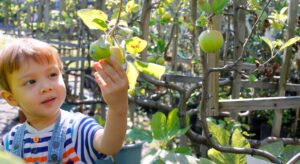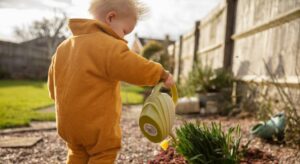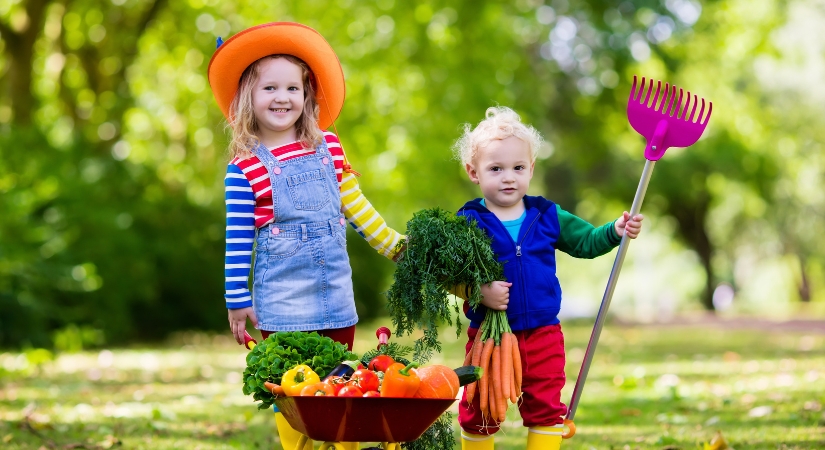In Early Years settings, introducing the concept of growing and planting foods can be a delightful and educational experience. Not only does it provide an opportunity for hands-on learning and sensory exploration, but it also promotes a deeper understanding of where food comes from and encourages healthy eating habits from an early age. Here are some ways you can introduce growing foods to the children in your setting:
Sensory Exploration:
Create a sensory garden, providing an immersive experience into the world of nature. Soft leaves, fragrant herbs, and vibrant flowers converge to offer a rich sensory palette. The garden becomes a sensory wonderland as children touch, smell, and observe the different plant types, cultivating an early appreciation for the beauty and diversity of the natural world. Incorporating seeds into the sensory play extends the exploration, allowing the children to feel, smell, and closely examine the distinct characteristics of each seed before embarking on the journey of planting and growth.
Gardening Tools and Imaginative Play:
Facilitate imaginative play by introducing child-friendly gardening tools. As miniature gardeners, children can mimic the actions of adults, fostering imaginative thinking and role-play. This interactive experience not only enhances fine motor skills but also instils a sense of responsibility as they engage in activities like digging, planting, and watering. The garden becomes a canvas for creative expression, where children can envision their own adventures and cultivate a lifelong love for gardening.
Storytelling and Books:
Enrich children’s vocabulary and understanding of nature by reading stories about plants, gardening, and the natural world. Each story opens a door to new concepts and ideas, fueling children’s curiosity and nurturing their love for growing foods. Through storytelling, toddlers embark on literary adventures that deepen their connection with nature and inspire a lifelong appreciation for the environment.
Garden Walks:
Take children on garden walks to explore the outdoor space and discover the beauty of plants and vegetables. Encourage them to touch, smell, and explore the different textures and scents, fostering an early connection with the natural world. These guided walks provide valuable opportunities for sensory exploration and inspire a sense of wonder and awe in young minds.
Interactive Planting Activities:
Engage children in simple planting activities. Provide them with large seeds or seedlings and guide them in placing them in soil-filled pots. Demonstrate how to plant and care for the seeds, involving them in watering and gentle nurturing. This hands-on experience introduces them to the concept of sowing and planting. By involving children in watering and nurturing the seeds, they learn valuable life skills and develop a deep appreciation for the magic of nature.
Observation Journals:
Encourage the children to document their gardening adventures through observation journals or nature diaries. Whether through drawings or photographs, these journals allow children to track the growth of plants over time, fostering a sense of ownership and pride in their achievements. As they observe and document the changes in the garden, children develop important observation and recording skills that lay the foundation for scientific inquiry and exploration.
Harvesting and Tasting:
When the plants are ready for harvest, involve children in the process. Let them pick the ripe fruits or vegetables, and encourage them to taste the delicious produce they have grown with their own hands. This experience completes the cycle and reinforces the connection between effort and reward.

Benefits of Planting and Growing Foods in Early Years Settings:
There are several benefits of planting and growing foods in Early Years settings, here are some of the key ones to consider:
Understanding Growth Cycles: Witnessing the transformation from seed to plant allows children to grasp fundamental concepts of growth and change. This understanding of natural cycles lays the groundwork for broader cognitive development.
Understanding Nature: Exploring the process of growing food helps children develop a connection with the natural world. They learn about plant life cycles, the importance of water and sunlight, and the role of insects in pollination. This understanding fosters an appreciation for the environment and encourages ecological awareness.
Healthy Eating: When children participate in growing and planting foods, they develop a greater appreciation for fresh fruits and vegetables. Children, through hands-on experiences, develop an early understanding of where their food comes from, promoting a lifelong appreciation for healthy eating habits.
Emotional Development: Caring for a growing plant provides children with a sense of responsibility and accomplishment. The emotional connection forged through nurturing a living thing contributes to a positive self-image and a feeling of competence.

By incorporating planting and growing food activities in Early Years settings, we pave the way for valuable learning experiences and the development of lifelong skills. From healthy eating to sensory exploration and ecological awareness, planting and growing foods benefits toddlers and babies across various areas of learning and development.

